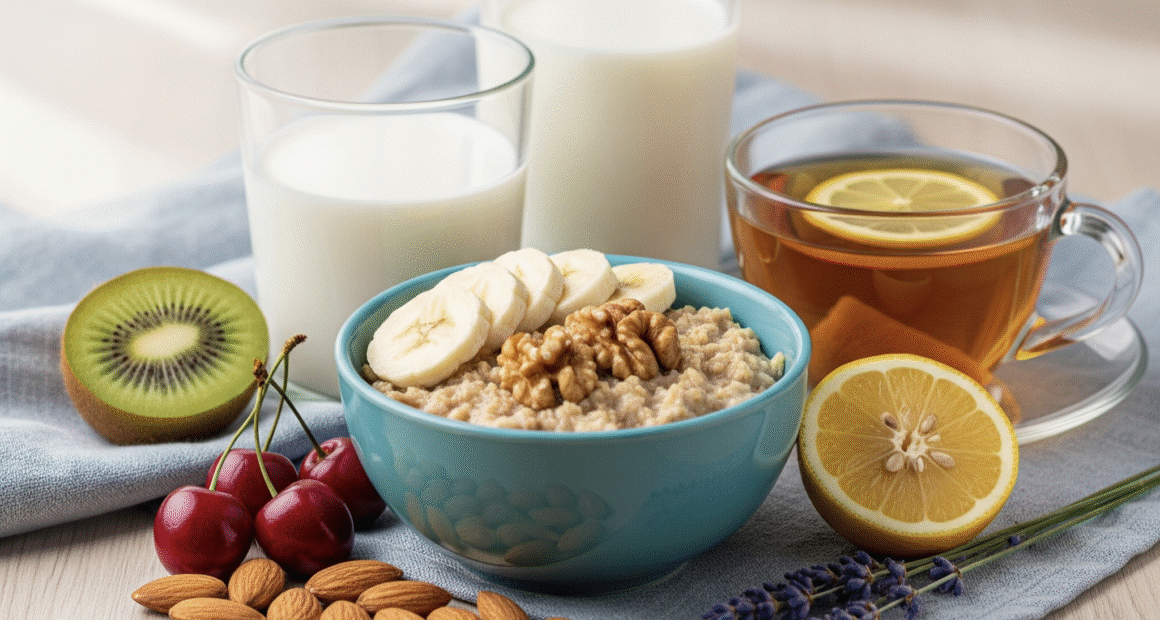Getting a good night’s sleep isn’t just about bedtime routines and reducing screen time—it’s also influenced by what you eat. Certain foods contain nutrients that support melatonin production, reduce stress hormones, and help relax the nervous system. Incorporating these foods into your diet can improve sleep quality, help you fall asleep faster, and leave you feeling more refreshed in the morning.
How Food Affects Sleep
The foods you consume affect your hormones, neurotransmitters, and overall energy levels. For example, meals rich in tryptophan, magnesium, and calcium can promote melatonin synthesis, which regulates sleep-wake cycles. On the other hand, high-sugar or highly processed foods can cause energy spikes and interfere with your body’s natural rhythms.
Top Foods to Improve Sleep Quality
1. Almonds
Almonds are high in magnesium, a mineral that promotes muscle relaxation and deeper sleep. Eating a small handful before bed can help calm the nervous system and improve overall sleep quality.
2. Chamomile Tea
Chamomile contains apigenin, an antioxidant that binds to receptors in your brain to reduce anxiety and promote sleepiness. A warm cup before bedtime can help relax your mind and body.
3. Kiwi
Rich in serotonin and antioxidants, kiwis can help regulate sleep cycles. Studies show that eating kiwi before bed can improve sleep onset, duration, and efficiency.
4. Fatty Fish
Salmon, mackerel, and tuna are rich in vitamin D and omega-3 fatty acids, which increase serotonin production, improving mood and promoting restorative sleep.
5. Walnuts
Walnuts contain melatonin and healthy fats that support heart health and help regulate sleep patterns. Adding a few walnuts to your evening snack can encourage better sleep.
6. Bananas
Bananas are high in potassium and magnesium, which help muscles relax. They also contain tryptophan, which the body converts into serotonin and melatonin.
7. Oatmeal
Oats are a source of melatonin and complex carbohydrates, which help increase the availability of tryptophan in the bloodstream. A small bowl of oatmeal before bed can induce calmness and sleep readiness.
8. Turkey
Turkey is well-known for its high tryptophan content. Eating a moderate portion in the evening can increase serotonin levels and help you feel drowsy.
9. Leafy Greens
Spinach, kale, and Swiss chard are rich in magnesium and calcium, supporting muscle relaxation and overall calmness for better sleep.
10. Dark Chocolate (In Moderation)
Dark chocolate contains serotonin and magnesium. A small piece in the evening can provide a relaxing effect, but avoid excessive consumption due to sugar and caffeine content.
Tips for Combining Foods for Better Sleep
- Avoid heavy, fried, or spicy meals right before bed, as they can cause indigestion and disrupt sleep.
- Pair tryptophan-rich foods with complex carbs to enhance absorption.
- Stay hydrated, but limit fluids right before bed to avoid nighttime trips to the bathroom.
- Use herbal teas like chamomile or lavender to complement sleep-friendly foods.
Lifestyle Habits to Enhance Food Benefits
In addition to eating the right foods, practicing good sleep hygiene maximizes their effects:
- Maintain a consistent sleep schedule, even on weekends.
- Limit screen time an hour before bed to reduce blue light exposure.
- Engage in light evening stretches or meditation to relax your mind.
- Keep your bedroom cool, dark, and quiet to support restorative sleep.
Conclusion
Food plays a crucial role in sleep quality and mental relaxation. Incorporating sleep-promoting foods like almonds, kiwi, fatty fish, and herbal teas can help your body and mind prepare for restful nights. Combined with proper sleep hygiene and mindful evening routines, these dietary choices can lead to better sleep, improved energy, and enhanced overall well-being. Start by making small adjustments to your diet today and notice the positive effects on your sleep and relaxation.









